What 101 dental hygienists said ... about loupes
As dental professionals, spending your day working in a small oral cavity plays a major role in ergonomics, and how your body feels at the end of the day. The dental field offers three basic types of optical aids that will magnify your small workspace: procedure scopes, surgical operating microscopes and loupes.
As dental professionals, spending your day working in a small oral cavity plays a major role in ergonomics, and how your body feels at the end of the day. The dental field offers three basic types of optical aids that will magnify your small workspace: procedure scopes, surgical operating microscopes and loupes.
Currently, loupes are the most popular type of magnification used by dental professionals. Modern Hygienist wanted to see your thoughts on the topic of dental loupes, and provide some insight from the loupe company most used by our surveyed readers.
I recently spoke to James Onderak, Director of R&D/Marketing for Orascoptic, to get Orascoptic’s input on why dental professionals should be using loupes when providing care.
Here are the results of our Modern Hygienist’s survey, interview exclusives from Orascoptic and information on the connection between loupes and improved ergonomics.
Who wears loupes?
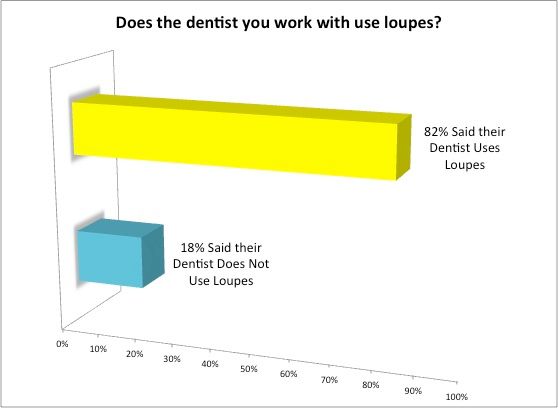
101 Hygienists were asked if the dentist they work with wears loupes.
From the survey, we found that 83% of hygienists and 82% of the dentists they work with wear loupes, leaving 17% of hygienists and 18% of dentists not wearing loupes.
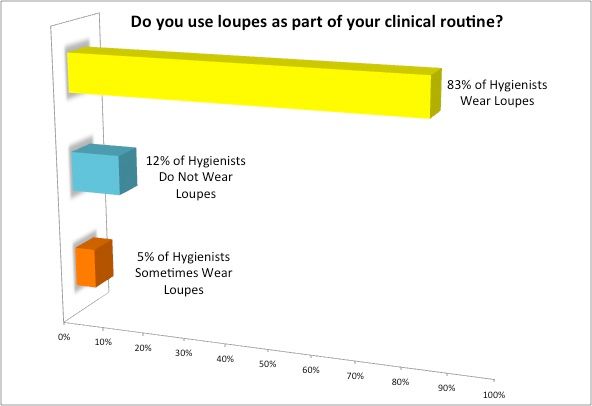
101 Hygienists were asked if they use loupes as part of their clinical routine.
Orascoptic gives three reasons for why all dental professionals should work with loupes:
Better patient care. You will see things you may have missed with the naked eye. Teeth are small. Fractures and calculus are even smaller. Magnifying these structures helps reduce the risk of missing a diagnosis and helps assist in developing the most appropriate treatment plan.
Career longevity. Properly fitted loupes will help relieve back and neck pain and prolong careers. Rather than the clinician having to bend down to the mouth, magnification brings the view of the mouth closer to the eye.
Productivity. You will process information, such as perio probe readings, faster and more accurately. Less work will not have to be redone or double-checked.
Additionally, Orascoptic notes “Loupes can be used for every procedure on every patient.” They explain that today’s loupes are smaller and lighter than past products, making them more comfortable for long lasting wear. They emphasized “the comfort and convenience factor of loupes is at an all-time high right now.” For example, Orascoptic’s new HDL loupe weighs just 1.3 ounces.
Would you like to use loupes?
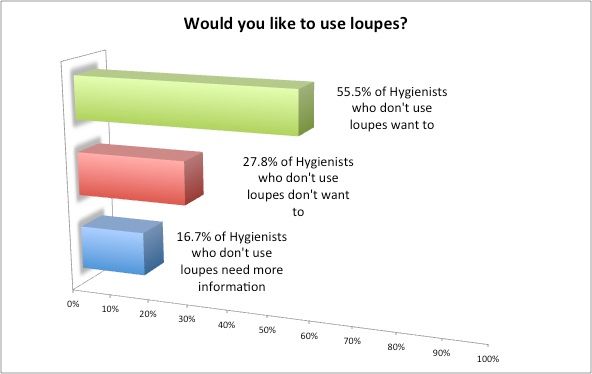
101 Hygienists survey of those hygienist who do not wear loupes to see if they would like to use loupes as part of their routine.
Over 50% of hygienists who do not use loupes would like to use them, and a good portion of you just want more information.
Orascoptic explains that some dental professionals may hold back from using loupes because they have a difficult time transitioning to a magnified image, which can cause them to become dizzy or nauseous. They recommend that practitioners should try to slowly adjust to using magnification by taking full advantage of risk-free trial periods.
They further explain that some who do not use loupes have the misconception that only “old” eyes need magnification. Orascoptic says that the ergonomic benefit of a loupe justifies the use of loupes for all practitioners: “Loupes are not just a way of seeing better, they are a way of working smarter, for both the patient and the clinician.”

Orascoptic's XV1 wireless loupe and head light.
For those who want to use loupes, Orascoptic says that dental professionals must “realize that an investment in a loupe is long-term investment in your career and your health.” They said to ask loupe companies about money-back trial periods, warranty terms and periods, interest-free payment plans, local representatives, if the lenses are glass or plastic, the coatings on the lens, charges for eye prescriptions, and an adjustable nose pad and flexible temple arm hinges.
Click here to see which brand of loupes Modern Hygienist's surveyed hygienists choose...
How did loupes become part of your toolbox?
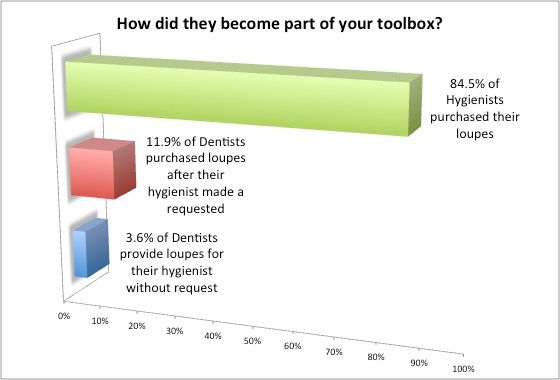
101 Hygienists survey of how loupes became part of the hygienist's toolbox.
Almost 85% of the surveyed hygienists said that they purchased their own loupe and only 12% of dentists purchased them after the hygienists requested them.
Orascoptic explains that most dentists and hygienists are introduced to loupes in school, and that they are invited to many schools to educate students on the features and benefits of loupes. “The overwhelming majority of dental schools mandate that their students wear loupes,” and “more and more hygiene schools, while not necessarily mandating loupes, are recommending them to students.”
Outside of school, Orascoptic sees that many dental professionals hear about loupes from their colleagues or seek out demonstrations of new designs at trade shows. Orascoptic also offers no-charge in-office product demonstrations for the entire office staff that make it convenient for dental professionals to learn about the latest optical designs.
What’s your brand?
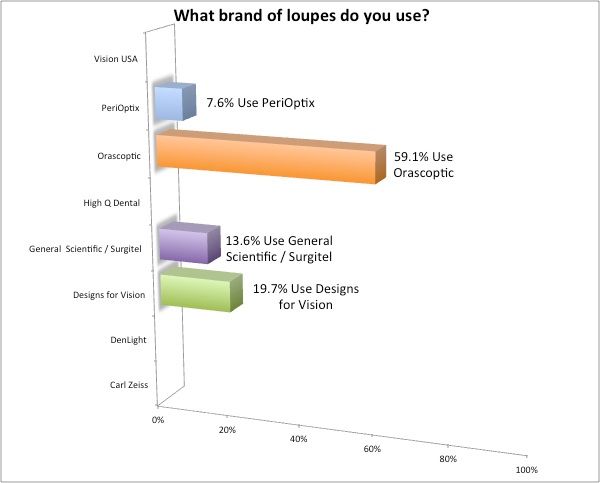
101 Hygienists survey of what brand of loupes they use.
Well, you are probably not surprised to see that majority of our surveyed hygienists use Orascoptic as their loupe brand. So, let’s see what they have to say about their products…
Orascoptic says that they are known for having “sharp resolution across a very wide and deep field.” They explain that while “most telescopes can provide a clear ‘sweet spot’ in the center of the viewing field, few can sustain clarity across the entire viewing field.”
Beyond clarity across the entire viewing field, Orascoptic has an extensive frame portfolio and lightweight optical design. Additionally, they offer very accurate and specific working distance that is within a half inch of your focal range.
How’s your current pair?
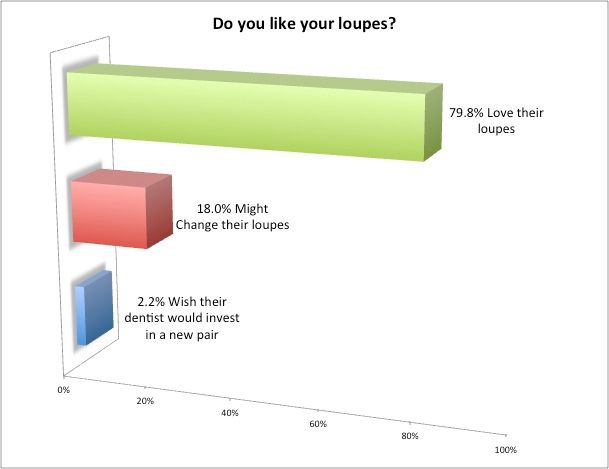
101 Hygienists survey of who likes their current loupes.
About 80% of Modern Hygienist’s surveyed hygienists like their current pair of loupes, but Modern Hygienist wants to help the other 20% out.
Orascoptic believes that the inability to adapt to magnification, which causes dizziness, can cause someone to be disenchanted with loupes very quickly. They recommend that dental professionals used the trial period to its full advantage because this initial dissatisfaction can be relieved.
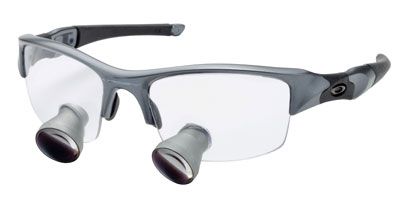
Orascoptic's HDLTM 2.5x loupe on Flak Jacket frame.
Another reason Orascoptic believes that some do not like using loupes is related to the field size. They explained that higher magnification powers have smaller field sizes compared to lower powers, and this sometimes causes practitioners to become frustrated.
Although some chose not to use loupes, Orascoptic gives the most common reason for why dental professionals should use loupes when providing care. Orascoptic says that the number one reason is that using loupes helps promote a “proper, more ergonomically sound sitting posture.”
Additionally, Orascoptic points out the obvious reason of advance patient care: “You can’t fix what you can’t see and loupes make it much easier to see all of the tiny structures in an oral cavity.”
Click here to learn what defines a "good" pair of loupes...
What defines a “good” pair of loupes?

101 Hygienists survey to see who knows the qualities of a "good" pair of loupes.
Approximately 40% of our surveyed hygienists are unsure of what qualities to look for in a “good” pair of loupes.
Orascoptic has three recommendations for what dental professionals should look for in a “good” pair of loupes:
Field Depth defines the focal range of an optical system. A deep field will allow the user more freedom to move his or her head and retain focus. A deep field can also ease the transition between a pediatric patient and a geriatric patient, who are typically positioned very differently in the patient chair.
Measure Brightness and Clarity of Image. The resolution of some telescopes is much more vibrant than others. And some telescopes cannot sustain clarity across the entire field-they become blurry around the edges. Some even explain that when wearing telescopes that do not provide clarity across the entire viewing field, they feel like there is lip balm smeared around their viewing field.
Weight and Comfort. Most dental professionals are going to wear their loupes all day long. Comfort often hinges on the features of the frame. Look for personalization elements such as an adjustable nose pad and flexible temple arm hinges to ensure a truly comfortable fit.
Is there really a connection between loupes and improved ergonomics for dental professionals?
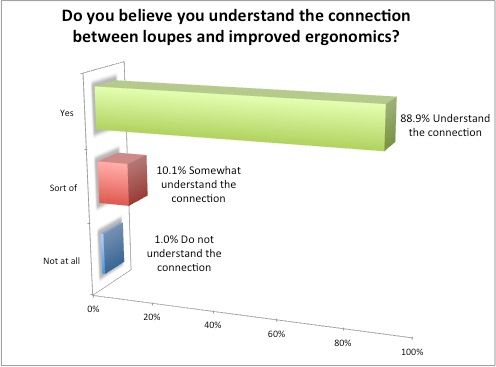
101 Hygienist survey to see who understands the connection between loupes and improved ergonomics.
About 90% of our surveyed hygienist understand the connection between loupes and improved ergonomics.
Orascoptic helped to explain the direct connection between loupes and neck and back health: “Properly fitted loupes will offer telescope declination angles that will support the user’s neck tilt between 10 and 20 degrees in the most traditional seated position.” Additionally, Orascoptic has seen that loupes can often also help reduce eye fatigue.